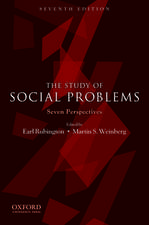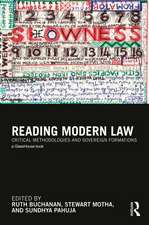Deviance: The Interactionist Perspective
Autor Earl Rubington, Martin Weinbergen Limba Engleză Paperback – 24 iul 2007
| Toate formatele și edițiile | Preț | Express |
|---|---|---|
| Paperback (1) | 797.43 lei 6-8 săpt. | |
| Taylor & Francis – 24 iul 2007 | 797.43 lei 6-8 săpt. | |
| Hardback (1) | 1014.74 lei 6-8 săpt. | |
| Taylor & Francis – 21 aug 2017 | 1014.74 lei 6-8 săpt. |
Preț: 797.43 lei
Preț vechi: 972.48 lei
-18% Nou
Puncte Express: 1196
Preț estimativ în valută:
152.58€ • 159.74$ • 126.26£
152.58€ • 159.74$ • 126.26£
Carte tipărită la comandă
Livrare economică 05-19 aprilie
Preluare comenzi: 021 569.72.76
Specificații
ISBN-13: 9780205503711
ISBN-10: 0205503713
Pagini: 496
Dimensiuni: 189 x 246 x 18 mm
Greutate: 0.88 kg
Ediția:10Nouă
Editura: Taylor & Francis
Colecția Routledge
Locul publicării:Oxford, United Kingdom
ISBN-10: 0205503713
Pagini: 496
Dimensiuni: 189 x 246 x 18 mm
Greutate: 0.88 kg
Ediția:10Nouă
Editura: Taylor & Francis
Colecția Routledge
Locul publicării:Oxford, United Kingdom
Public țintă
UndergraduateNotă biografică
Earl S Rubington, Northeastern University
Martin S. Weinberg, Indiana University
Martin S. Weinberg, Indiana University
Cuprins
Preface. General Introduction. Part 1: The Social Deviant Part 1A: The Process of Social Typing 1. Outsiders 2. Redheads as Deviant Types 3. Wheelchair Users Part 1B: The Cultural Context 4. Labeling the Mentally Retarded 5. Fecal Matters 6. The Labeling of Sexual Harrassment Part 1C: Accommodation to Deviance 7. How Women Experience Battering 8. Accommodation to Madness 9. When Accommodation Breaks Down Part 1D: The Role of Third Parties 10. The Enforcement of College Alcohol Policy 11. Paranoia and the Dynamics of Exclusion 12. The Moral Career of the Mental Patient Part 2: The Formal Regulation of Deviance Part 2A: Agencies and Their Theories 13. Case Routinization in Investigative Police Work 14. Control Agents and the Creation of Deviant Types 15. Experts on Battered Women Part 2B: Organizational Processing of Deviants 16. Discipline in an Urban High School 17. Sexual Assault 18. Mental Illness Assumptions in Commitment Hearings Part 2C: The Effects of Contact with Control Agents 19. The Saints and the Roughnecks 20. Medical Diagnosis and the Reinforcement of Deviant Labels 21. The Positive Consequences of Stigma Part 3: Relations Among Deviants Part 3A: The Social Organization of Deviants 22. Types of Relationships 23. Self-Injurers as Loners 24. Collegiate Rugby and Subcultural Deviance Part 3B: Getting Into Deviant Groups 25. Becoming a Nudist 26. Getting into Gangs 27. Doing Porn Part 3C: Acculturation to Group Norms 28. The Code of the Streets 29. The Nudist Management of Respectability 30. Lesbians' Resistance to Culturally-Defined Attractiveness Part 3D: Social Diversity 31. Crack Use on a College Campus 32. Outsiders in a Hearing World 33. Diversity in Panhandling Part 4: Deviant Identity Part 4A: Acquiring a Deviant Identity 34. Becoming Bisexual 35. Anorexia, Bulimia and Developing a Deviant Identity 36. Tattoos Without Stigma Part 4B: Managing a Deviant Identity 37. Modes of Suburban Gay Identity 38. Pit Bull Owners and Stigma 39. Veterinarians' Deviance and Neutralization Techniques Part 4C: Transforming Deviant Identity 40. Natural Recovery 41. Getting Out of the Life 42. Medicalizing and Demedicalizing Hermaphroditism
Descriere
This highly successful reader presents the interactionist approach to the study of deviance, examining deviance as a phenomenon that is constituted through social interpretations and the reactions of persons caught up in this social process. This book focuses on issues such as how individuals interpret and label people, how people relate to one another based on these interpretations, and the consequences of these social processes. This perspective helps students understand both social process in general and the sociology of deviance in particular.















